PhD defence: Glucose uptake and glycogen synthesis in recovery from exercise
Molecular mechanisms regulating the "set-point" for muscle glucose storage
Janne Rasmus Hingst
PhD thesis
 A single bout of exercise sensitizes skeletal muscle for insulin action on glucose uptake and glycogen synthesis. When a single bout of exercised is followed by intake of carbohydrates muscle glucose storage capacity can increase markedly above resting values (glycogen supercompensation).
A single bout of exercise sensitizes skeletal muscle for insulin action on glucose uptake and glycogen synthesis. When a single bout of exercised is followed by intake of carbohydrates muscle glucose storage capacity can increase markedly above resting values (glycogen supercompensation).
In the present PhD study we aimed to investigate whether the beneficial effects of prior exercise on glucose metabolism are preserved in muscles from insulin resistant subjects with T2D. In addition the cellular mechanisms leading to glycogen supercompensation in skeletal muscle were studied.
Exercise enhanced activity of the enzyme glycogen synthase and increased affinity for the substrate UDP-glucose to a similar extent in T2D subjects and obese controls. However, 3 hours into recovery we observed decreased activation and reduced affinity of glycogen synthase.
This observation was associated with abnormal phosphorylation of glycogen synthase. In lean and healthy subjects exercise followed by intake of carbohydrate increased muscle glycogen in the prior exercised muscle. Interestingly, enzyme activity of glycogen synthase remained elevated even when muscle glycogen levels were returned to resting levels. This "overshoot" in enzyme activity was associated with maintained lower phosphorylation of glycogen synthase.
2016, 177 pages.
Time
23 September 2016, 15:15
Venue
Auditorium 1, August Krogh Building, Universitetsparken 13, DK-2100 Copenhagen.
Opponents
Professor Ylva Hellsten (chair), Department of Nutrition, Exercise and Sports, University of Copenhagen, Denmark.
Professor Emeritus Terry Graham, University of Guelph, Canada.
Associate Professor Niels Jessen, Aarhus University, Denmark.
Supervisor
Professor Jørgen F. P. Wojtaszewski, Department of Nutrition, Exercise and Sports, University of Copenhagen, Denmark.
